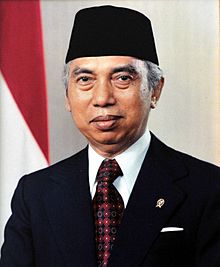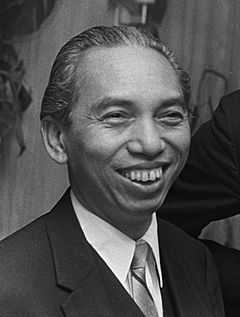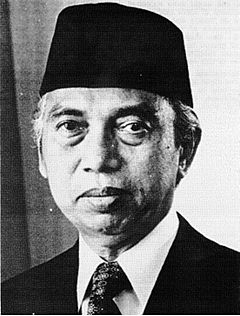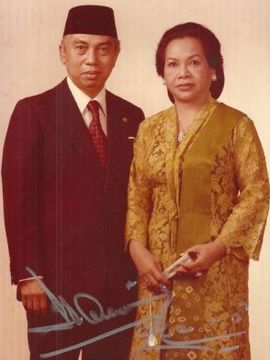Adam Malik facts for kids
Quick facts for kids
Adam Malik
|
|
|---|---|

Official portrait, c. 1978
|
|
| 3rd Vice President of Indonesia | |
| In office 23 March 1978 – 11 March 1983 |
|
| President | Suharto |
| Preceded by | Hamengkubuwono IX |
| Succeeded by | Umar Wirahadikusumah |
| 4th Speaker of the People's Consultative Assembly |
|
| In office 1 October 1977 – 23 March 1978 |
|
| Preceded by | Idham Chalid |
| Succeeded by | Daryatmo |
| 7th Speaker of the People's Representative Council |
|
| In office 1 October 1977 – 23 March 1978 |
|
| Preceded by | Idham Chalid |
| Succeeded by | Daryatmo |
| 11th Minister of Foreign Affairs | |
| In office 28 March 1966 – 1 October 1977 |
|
| President | Sukarno Suharto |
| Preceded by | Subandrio |
| Succeeded by | Mochtar Kusumaatmadja |
| 26th President of the United Nations General Assembly | |
| In office 1971–1972 |
|
| Preceded by | Edvard Hambro |
| Succeeded by | Stanisław Trepczyński |
| Personal details | |
| Born |
Adam Malik Batubara
22 July 1917 Pematangsiantar, Dutch East Indies |
| Died | 5 September 1984 (aged 67) Bandung, Indonesia |
| Resting place | Kalibata Heroes Cemetery |
| Political party | Golkar |
| Other political affiliations |
|
| Spouse |
Nelly Malik
(m. 1942) |
| Profession | |
| Signature | |
| Military service | |
| Allegiance | |
| Branch/service | Indonesian Guerillas |
| Years of service | 1940s |
| Rank | Commandant |
| Battles/wars | World War II Indonesian National Revolution |
Adam Malik Batubara (born July 22, 1917 – died September 5, 1984) was an important Indonesian politician, diplomat, and journalist. He served as the 3rd Vice President of Indonesia from 1978 to 1983, working alongside President Suharto.
Before becoming Vice President, he held many important roles. He was the Speaker of the People's Consultative Assembly and the Speaker of the People's Representative Council from 1977 to 1978. He also served as the Foreign Minister of Indonesia for a long time, from 1966 to 1977. In 1971, he was even chosen as the president of the United Nations General Assembly, a very high international position.
Adam Malik was born in Pematangsiantar, North Sumatra. He helped start the Antara news agency in 1937. He was a strong supporter of Indonesia's independence. He was even put in prison for speaking out against the Dutch colonial government. He played a key role in the events leading up to Indonesia's independence on August 17, 1945. After Indonesia became independent, he continued to serve his country in various government jobs. He was named a National Hero in 1998.
Contents
Early Life and Education
Adam Malik Batubara was born on July 22, 1917, in Pematangsiantar, North Sumatra. He came from a Batak Mandailing Muslim family. His parents, Abdul Malik Batubara and Salamah Lubis, were traders. Adam was the third of nine children.
His family was quite well-off. They even owned the only Buick sedan in their hometown. Growing up, Adam Malik loved to read, take photos, and watch cowboy films. He went to the Hollandsch-Inlandsche School (HIS) in Pematangsiantar for his basic education. He later studied at an Islamic boarding school in Bukittinggi but returned home to help his family.
Starting His Career
Adam Malik got involved in politics in 1930 when he was just 13 years old. He was very dedicated to helping Indonesia become independent. When he was 17, he became the leader of the Partindo (Indonesia Party) branch in Pematangsiantar. He pushed for Indonesia to gain independence from the Dutch colonial government. Because of this, he was arrested for holding political meetings that were banned.
After being released, Malik moved to Jakarta. At 20, he started a career in journalism. In 1937, he helped create the Antara news agency. He became an editor and deputy director there. He also wrote for other newspapers and magazines.
Role in Independence
During the Japanese occupation, Adam Malik was part of a youth movement preparing for Indonesia's independence. He actively worked against the Japanese military. He played a big part in the events leading to Indonesia's Declaration of Independence.
On August 16, 1945, Malik and other young independence supporters took nationalist leaders Sukarno and Mohammad Hatta to Rengasdengklok. They urged them to declare Indonesia's independence quickly. Sukarno and Hatta finally declared Indonesia's Independence on August 17, 1945. They became Indonesia's first President and Vice-President.
After Indonesia's sovereignty was recognized, Adam Malik became very active in various organizations. He helped found the People's Party and the Murba Party. In 1956, he became a member of the People's Representative Council. He then served as Minister for Trade from 1963 to 1964. Later, he became a diplomat, serving as ambassador to the Soviet Union and Poland in 1959. He also led Indonesia's team for talks with the Netherlands about the West Irian region in Washington, D.C..
New Order Era
As President Sukarno's policies seemed to be influenced by the Indonesian Communist Party (PKI), Adam Malik helped create an organization to interpret Sukarno's ideas in a non-Communist way. Sukarno later banned this group. Adam Malik was known for being against Communism.
In 1966, Sukarno gave his executive powers to Lieutenant General Suharto. This was done through a special presidential order called Supersemar. Although Sukarno remained President in name, Suharto held the real power. After this, Adam Malik became the Minister of Foreign Affairs. Malik, along with Suharto and Hamengkubuwono IX, worked together to change Sukarno's previous policies.
Foreign Minister and ASEAN
As Foreign Affairs Minister, Adam Malik traveled to Western countries to help reschedule Indonesia's debt payments. He also left the Murba Party to support the new government's more open economic policies.
In 1967, Malik helped form the ASEAN with the Foreign Ministers of the Philippines, Thailand, Singapore, and the Deputy Prime Minister of Malaysia. ASEAN was created to build a strong, united front in Southeast Asia. It focused on economic cooperation.
Adam Malik also became President of the United Nations General Assembly in 1971. He played a role in international diplomacy. In 1977, he left his position as Foreign Minister to become the Chairman of the People's Consultative Assembly (MPR).
Vice Presidency
It was expected that President Suharto and Vice President Hamengkubuwono IX would continue to serve together. However, Hamengkubuwono IX decided not to be nominated again. He was concerned about the government's increasing power and corruption.
After considering other people, Suharto chose Adam Malik to be his Vice President. Adam Malik became the 3rd Vice President of Indonesia in 1978.
As Vice President, Adam Malik felt he didn't have a very active role in daily government decisions. He spent some of his time collecting various items like ceramics, statues, and precious stones. More than 5,000 objects from his collection are now shown in a museum managed by his wife.
Even as Vice President, Adam Malik was not afraid to speak his mind. In 1979, he said that the government was not fully following the spirit of the 1945 constitution. He also spoke out against the growing corruption in the government, calling it an "epidemic" in 1981.
Death and Legacy
After his term as Vice President ended in 1983, Adam Malik moved to Bandung, West Java. He passed away on September 5, 1984, due to liver cancer. His body was buried in the Kalibata Heroes Cemetery, a special burial ground for heroes.
Later, his wife and children honored his memory by opening the Adam Malik Museum. This museum displays many of his collections and tells his life story. On November 6, 1998, Adam Malik was officially named a National Hero for his great contributions to the country.
Honors and Awards
National Honors
 Star of the Republic of Indonesia, 2nd Class (Indonesian: Bintang Republik Indonesia Adipradana) (1973)
Star of the Republic of Indonesia, 2nd Class (Indonesian: Bintang Republik Indonesia Adipradana) (1973) Star of Mahaputera, 1st Class (Indonesian: Bintang Mahaputera Adipurna) (1978)
Star of Mahaputera, 1st Class (Indonesian: Bintang Mahaputera Adipurna) (1978) Star of Mahaputera, 4th Class (Indonesian: Bintang Mahaputera Pratama) (1961)
Star of Mahaputera, 4th Class (Indonesian: Bintang Mahaputera Pratama) (1961)
Foreign Honors
Personal Life
Adam Malik was married to Nelly Malik in 1942. Nelly was the second daughter of a Minangkabau family. She also actively supported her husband's political work and the struggle for independence. Together, they had five children: Otto Malik, Antarini Malik, Ilham Malik, Imron Malik, and Budisita Malik.
See Also
 In Spanish: Adam Malik para niños
In Spanish: Adam Malik para niños
- Bangkok Conference
- Antara news agency
- Murba Party
 | Janet Taylor Pickett |
 | Synthia Saint James |
 | Howardena Pindell |
 | Faith Ringgold |




